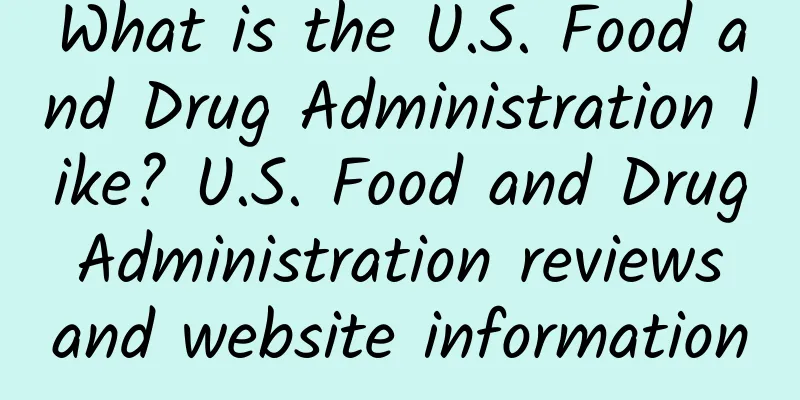What is the U.S. Food and Drug Administration like? U.S. Food and Drug Administration reviews and website information

|
What is the website of the US Food and Drug Administration? The US Food and Drug Administration (FDA) is a specialized agency of the federal government, affiliated with the US Department of Health and Human Services. It mainly supervises and manages food, dietary supplements, drugs, vaccines, biopharmaceuticals, blood products, medical equipment, radioactive equipment, veterinary drugs and cosmetics produced and imported into the United States. In addition, it is also responsible for enforcing Section 361 of the Public Health Service Act, including inspections of public health conditions and interstate travel and transportation, and control of diseases that may exist in many products. Website: www.fda.gov The US Food and Drug Administration (FDA) is a specialized agency of the federal government, under the US Department of Health and Human Services. The main responsibility of the FDA is to supervise and manage food, dietary supplements, drugs, vaccines, biopharmaceuticals, blood products, medical equipment, radioactive equipment, veterinary drugs and cosmetics produced and imported into the United States. In addition, the FDA is also responsible for enforcing Section 361 of the Public Health Service Act, including inspections of public health conditions and interstate travel and transportation, as well as control of diseases that may exist in many products. FDA HistoryThe history of the FDA can be traced back to 1906, when the United States passed the Pure Food and Drug Act, the first law in U.S. history to protect consumers from unsafe and fraudulent food and drugs. The passage of the Act marked the establishment of the Bureau of Chemistry, the predecessor of the FDA. Over time, the FDA's responsibilities and powers continued to expand, gradually evolving into today's U.S. Food and Drug Administration. FDA's main responsibilitiesThe main responsibilities of the FDA include the following:
FDA's Organizational StructureThe FDA has a large organizational structure with multiple centers and offices responsible for different areas of regulation. The following are the main departments and centers of the FDA:
FDA’s Regulatory ProcessThe FDA regulatory process usually includes the following steps:
FDA’s Global ReachThe FDA is not only an important regulatory agency in the United States, but its influence also extends to the world. Drug and medical device regulatory agencies in many countries and regions refer to the FDA's standards and guidelines to ensure the safety and effectiveness of their products. In addition, the FDA also cooperates with regulatory agencies in other countries and regions to jointly respond to global public health challenges. FDA's Challenges and FutureAlthough the FDA has made remarkable achievements in protecting public health, the challenges it faces cannot be ignored. With the rapid development of science and technology, new drugs, medical devices and biological products continue to emerge, and the FDA needs to constantly update its regulatory strategies and technical means to meet these new challenges. In addition, the globalization of production and supply chains has also brought new complexities to the FDA's regulatory work. In the future, the FDA will continue to strengthen its regulatory capabilities and improve its scientific and technological capabilities to better protect public health. At the same time, the FDA will further strengthen cooperation with other countries and regions to jointly respond to global public health challenges. FDA's Public Education and OutreachThe FDA is not only a regulatory agency, but also has the responsibility of public education and publicity. Through its official website, social media platforms and various publicity activities, the FDA popularizes knowledge about food safety, drug safety and medical device safety to the public, helping them better understand and respond to health risks. FDA website and contact informationThe FDA's official website is www.fda.gov , where the public can obtain the latest regulatory information, guidelines and announcements. In addition, the FDA has multiple hotlines and email addresses through which the public can contact the FDA to inquire about related issues or report adverse events. ConclusionAs one of the most influential regulatory agencies in the world, the U.S. Food and Drug Administration (FDA) plays a vital role in protecting public health. Through strict supervision and scientific evaluation, the FDA ensures the safety and effectiveness of food, drugs, medical devices and cosmetics in the U.S. market. In the future, the FDA will continue to work to enhance its regulatory capabilities, respond to new challenges, and safeguard global public health. |
<<: What is Charlotte Russe like? Charlotte Russe reviews and website information
>>: How is Walmart? Walmart reviews and website information
Recommend
How to fry chili oil
Preparation: good chili powder, pepper, sesame, s...
What is the Bahrain government like? Bahrain government reviews and website information
What is the Bahrain Government website? This websi...
The effect of red dates and wolfberries soaked in wine
Red dates and wolfberries are an ideal pair. They...
How is the Academy of Fine Arts in L'Aquila? Reviews and website information of the Academy of Fine Arts in L'Aquila
What is the website of L'Aquila Academy of Fin...
The difference between fragrant wood and pepper wood
Both the fragrant wood and the pepperwood are com...
The efficacy and function of purple sweet potato peel
Purple sweet potatoes are often used by everyone,...
The nutritional value of red grapes What are the benefits of eating red grapes
Red grape is a kind of grape, also called late re...
7 taboos of eating jackfruit
Jackfruit is a common fruit produced in the south...
Will eating walnuts make you fat? What are the benefits of eating walnuts?
Walnuts are a kind of nut food that many people l...
How is Lanzi? Lanzi reviews and website information
What is Lancel? Lancel is a famous French luggage ...
Bamboo leaves
Bamboo leaves: sweet, slightly cold, non-toxic. B...
Fresh pomegranate peel boiled water drinking effect and benefits
Pomegranate is a kind of fruit with many small fr...
What is Goldman Sachs like? Goldman Sachs reviews and website information
What is Goldman Sachs? Goldman Sachs is a large mu...
How to store fresh jasmine flowers How to store fresh jasmine flowers
In daily life, people have drunk fragrant jasmine...
Seven benefits of drinking jujube soaked in water
Jujube can not only be used to cook porridge, but...









